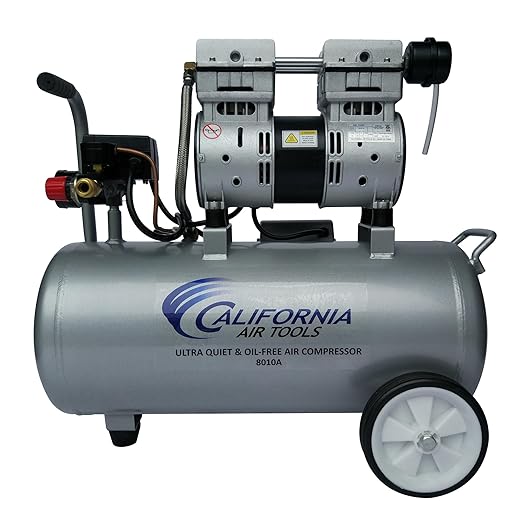







Understanding Low Noise Compressors: The Quiet Revolution in Air Compression
In a world where noise pollution is often overlooked, the importance of a low noise compressor cannot be understated. Whether you’re a DIY enthusiast, a contractor, or simply someone who values peace and quiet, the right compressor can make all the difference. Imagine a tool that works diligently in the background, allowing you to focus on your tasks without the incessant drone of a traditional compressor. Sounds appealing, right? Let’s delve into the intricacies of low noise compressors and explore their benefits, functionality, and top picks on the market today.
What is a Low Noise Compressor?
A low noise compressor is designed to operate at significantly reduced sound levels compared to standard air compressors. While traditional compressors can reach sound levels of 90 decibels or more—equivalent to the roar of a lawnmower—low noise models typically operate between 50 to 70 decibels. This makes them ideal for indoor use, residential areas, and environments where noise restrictions are in place.
But how do they achieve this tranquility? The secret often lies in advanced engineering techniques, such as soundproof enclosures, specialized mufflers, and vibration-reducing mounts. These features work harmoniously to minimize noise without sacrificing performance.
Why Choose a Low Noise Compressor?
You might wonder, “Is a low noise compressor really worth the investment?” The answer often lies in your specific needs. Here are a few compelling reasons to consider:
1. **Reduced Noise Pollution**: If you’re working on a project at home or in a crowded workspace, a quieter compressor allows you to operate without disturbing others. It’s like choosing a whisper over a shout in a library.
2. **Improved Focus**: The sound of a traditional compressor can be distracting. A low noise model enables you to concentrate better on your tasks, enhancing productivity. Think of it as having a serene background score while working on your masterpiece.
3. **Versatile Use**: Many low noise compressors are portable and lightweight, making them suitable for various applications—from inflating tires to powering pneumatic tools. Their adaptability is akin to a Swiss Army knife, ready for any task.
Key Features to Look For
When shopping for a low noise compressor, consider the following features to ensure you make an informed decision:
– **Decibel Rating**: This is the most crucial factor. Aim for a compressor with a rating below 70 decibels for optimal quiet operation.
– **Tank Size**: Larger tanks store more air, allowing for longer run times between refills. However, keep in mind that a bigger tank may weigh more.
– **Portability**: If you plan to move your compressor frequently, look for lightweight options with built-in handles or wheels.
– **Power Source**: Decide between electric and gas-powered compressors. Electric models are generally quieter and more suited for indoor use, while gas compressors can provide more power for heavy-duty tasks outdoors.
Top Picks for Low Noise Compressors
Here are three highly regarded low noise compressors that stand out in the market:
1. **California Air Tools 8010**: This model operates at just 60 decibels and features a 1.0-gallon tank. It’s lightweight and portable, making it perfect for home use and small jobs.
2. **DEWALT D55140**: Known for its durability, this compressor operates at 75 decibels and boasts a 1-gallon tank. Its oil-free pump ensures maintenance-free operation, which is a significant plus.
3. **Makita MAC2400**: With a noise level of 79 decibels, this heavy-duty compressor offers a powerful performance. Its cast-iron cylinder and oil-lubricated pump ensure longevity and efficiency.
Maintenance Tips for Longevity
Like any tool, proper maintenance is key to extending the life of your low noise compressor. Here are a few tips to keep it running smoothly:
– **Regular Oil Changes**: If your compressor requires oil, change it regularly to prevent wear and tear.
– **Check the Air Filter**: A clean air filter ensures efficient operation. Replace or clean it according to the manufacturer’s recommendations.
– **Drain the Tank**: Water can accumulate in the tank, leading to rust and damage. Drain it after each use to keep it in top shape.
– **Inspect Hoses and Fittings**: Regularly check for leaks or wear in hoses and fittings, replacing them as needed to ensure optimal performance.
Conclusion
In conclusion, a low noise compressor is an invaluable tool for anyone seeking a quieter working environment without compromising on performance. From DIY projects to professional tasks, these compressors deliver efficiency wrapped in silence. As noise pollution continues to be a growing concern, investing in a low noise compressor is not just a choice; it’s a step towards a more peaceful and productive workspace.
FAQs
1. How loud is a low noise compressor?
Most low noise compressors operate between 50 to 70 decibels, significantly quieter than traditional models.
2. Can I use a low noise compressor for heavy-duty tasks?
Yes, many low noise compressors are designed to handle heavy-duty tasks while maintaining lower sound levels, though it’s essential to check the specifications.
3. Are low noise compressors more expensive than regular compressors?
Generally, low noise compressors can be slightly more expensive due to their advanced technology, but the investment often pays off in terms of comfort and noise reduction.
